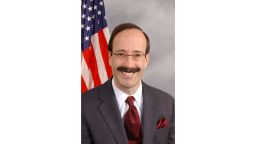Editor’s Note: Rep. Eliot L. Engel, a New York Democrat, is ranking member of the US House Committee on Foreign Affairs. Anders Fogh Rasmussen is former NATO secretary general and former Prime Minister of Denmark. The views expressed in this commentary are their own.
This week, President Donald Trump will travel to the NATO summit in Brussels. America’s allies will pay close attention to his every word and seek strong reassurances that the United States will continue to play a leading role in the critical alliance. We sincerely hope he provides those reassurances.
NATO is not, as Trump has stated, taking advantage of the United States. The alliance was forged out of the ashes of two world wars under American leadership. Together, the allies honored those hundreds of thousands of service members who lost their lives by building a system to prevent such conflicts from igniting again.


The relative peace and stability that NATO and other postwar institutions provided the United States and Europe in the late 20th century cannot be underestimated. With American leadership, allied democracies created the conditions for unparalleled prosperity for ordinary Americans and Europeans alike – and defeated the communist threat.
Today, that world is facing renewed danger, and our common challenges are no less significant. They include the growing Russian threat, transnational terrorism, cyberwarfare, piracy on the high seas and the proliferation of weapons of mass destruction, among others. Just as the United States underpinned NATO’s resolve to provide collective security against the Soviet Union, an American retreat today will allow autocrats and dictators to advance.
NATO is engaged around the world, supporting a range of interests critical to the United States and its partners. NATO allies continue to uphold the concept of collective defense – an attack on one is an attack on all. This commitment was put into practice for the first and only time in NATO history after September 11, 2001, when NATO forces stood shoulder to shoulder in support of the United States.
Even with the ever-expanding list of challenges, NATO has responded. Recent and ongoing NATO missions include bolstering defenses against Russia’s aggressive posture along the alliance’s eastern border; leading the 41-country-strong stabilization operation in Afghanistan; the counter-ISIS mission in Iraq and Syria; anti-terrorist activities in the Mediterranean Sea region; anti-piracy missions to secure vital shipping routes in the Gulf of Aden off the African coast, enhancing cybersecurity measures among allies; and supporting humanitarian and peacekeeping missions, which at one time included delivery of 189 tons of relief supplies for Americans affected by Hurricane Katrina in 2005.
If the last 70 years of peace on the European continent show us anything, it’s that the international political willpower and the joint military resources mustered by NATO are critical to global security.
Yet NATO’s continued ability to protect its member states and bolster global stability cannot be taken for granted. American leadership of a trans-Atlantic alliance is its greatest competitive advantage over rival powers, especially an autocratic Russia and a strengthening China. Going it alone in the world is a gravely misguided approach that risks the lives of Americans as well as Europeans and millions of others around the world.
The United States has ensured its own security, in part, by embracing the pre-eminence of American and European shared values, including democracy, freedom, human rights, market-based economies and the rule of law around the world. No other alliance in the history of the globe has provided greater wealth, peace or freedom for its citizens. It must continue to do so.
Like any other institution, NATO is not perfect. Most allies need to spend more on defense. Fortunately, as a trend, allied defense spending is rising. America is right to continue raising this issue, and Trump is certainly not the first President to demand that Europeans shoulder a greater share of the burden. But bringing all the allies onboard when it comes to budgets and strategy takes time, patience and careful diplomacy. It won’t be accomplished by threats and bravado; in fact, such an approach will likely deliver the opposite outcome.
We must remember that NATO allies’ acceptance of American global leadership is not preordained. Indeed, America has gained substantially from the world order that it built and has fought to sustain for 70 years. Trump dismantles that system at America’s peril, and that of its allies and partners around the world.
We hope while in Brussels, Trump shows that America can lead the world rather than simply transacting with it on a short-term basis. As Winston Churchill wisely once said, “There is at least one thing worse than fighting with allies – and that is to fight without them.”
Trump should take note. The world is facing too many threats for the United States to go it alone.


